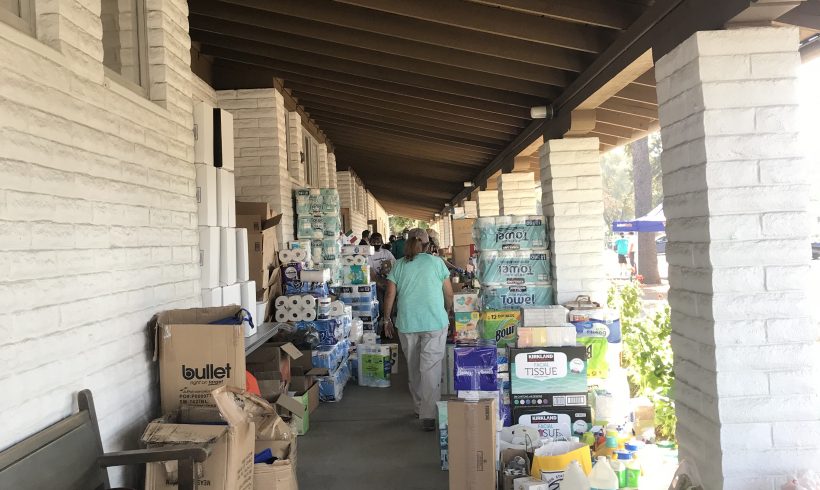
On a sunny Saturday morning in October, members of the Central Coast Mutual Aid Network gathered in front of the Old Mission in San Juan Bautista. Masked, and distanced, we circled up to put the final details on the packs containing the last of 2,000 KN95 masks we had distributed at similar events throughout the summer. We stood in the parking lot, enjoying the rare treat of seeing each other in person– a welcome change from our normal virtual meetings. On this particular morning, the catalyst for our in person gathering was our participation in the Farmworker Caravan, a monthly donation/distribution event headed up by Darlene Tenes of CasaQ, and in collaboration with a number of local nonprofit organizations, that gets necessities into the hands of farmworkers in San Benito, Monterey, Santa Clara, and Santa Cruz counties. We had been asked to recruit volunteers to help with the collection of food, PPE, and cleaning and household supplies which would all be distributed to Farmworkers in San Benito County at the end of the month, and our members turned out. We spent the morning greeting and directing traffic, and unloading mountains of donated goods from over 100 cars who were all part of the caravan driving through to donate. We then organized and sorted those goods into boxes to be handed out to our farmworker neighbors.
Agriculture is the largest economic sector in Monterey County, accounting for 19.7% of all economic output and over 20% of the county’s jobs. In San Benito County, it accounts for over $352 million of the county’s economic output. Yet the farmworkers who grow, harvest, and process the food we eat rarely have access to that food themselves due to low wages and food deserts, even in the best of times. In the midst of pandemic-induced economic volatility, the struggle to afford basic necessities only becomes more severe and unpredictable. These past several months have added additional burden as those working in the fields have had to cope with increased vulnerability to Covid 19. As essential workers, who have generally not been provided the necessary PPE despite OSHA requirements, they are three times more likely to contract COVID than the general population. On top of this, farmworkers continued to work the fields as climate change caused extreme heat waves and a record breaking fire season that made our air hazardous to breathe.
As members of the Central Coast Mutual Aid Network, we do not see this act of getting necessities into the hands of farmworkers as charity. We believe it is our responsibility, as members of this community, to care for each other, and to change the political systems that creates this inequity. Whereas charitable organizations are often operated using a top down approach, with donors and board members determining how funds should be used, Mutual Aid Networks are non hierarchical. Meetings are open to the public, and all members participate in consensus based decision making. Those who will be impacted by the decisions are encouraged to participate in making the decisions, and the ultimate goal is self-determination, solidarity, and increased engagement with the root issues that are creating the need for aid. The term was coined by Russian anarchist Peter Kropotkin, who argued that the survival and prosperity of both ecological and human communities were determined more by collaboration and cooperation for mutual benefit than by competition.
The Central Coast Mutual Aid Network itself was formed through collaborative efforts and much cooperative support. We recognized early on in the pandemic that many of our more vulnerable neighbors were in need of additional assistance. As we began to brainstorm how to form a network, we came across South Bay Mutual Aid, who already had extensive systems in place that helped the network run smoothly. They have been immensely generous in sharing their experience, knowledge, and systems with us as we get our own network going. And the network of support doesn’t stop there. The masks we were able to distribute to farmworkers over the past months were donated to us by the San Francisco Chapter of the Dempcratic Socialists of America, who received 14,000 masks from UCSF that they’ve been distributing widely and generously to other organizations, networks, and individuals. The newly formed Central Coast Chapter of the DSA has also been instrumental in getting the Mutual Aid Network started.
The world can seem like a dark, unpredictable place these days. With covid cases on the rise, and the future of our communities at stake, it can be easy to fall into despair. But the ethos of these mutual aid networks, and the community of collaboration and mutually beneficial support they foster, have been keeping me hopeful as we navigate this tumultuous time. In forming these networks, and taking responsibility for each other, we are living the future we want to create.
If you’re interested in joining our Central Coast Mutual Aid Network, we would be thrilled to have you! Visit centralcoast.aidnetwork.org and sign up. We are all we have, and we look forward to collaborating with you. Solidarity!
